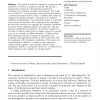Free Online Productivity Tools
i2Speak
i2Symbol
i2OCR
iTex2Img
iWeb2Print
iWeb2Shot
i2Type
iPdf2Split
iPdf2Merge
i2Bopomofo
i2Arabic
i2Style
i2Image
i2PDF
iLatex2Rtf
Sci2ools
116
click to vote
ALIFE
2004
2004
Autopoiesis and Cognition
This article revisits the concept of autopoiesis and examines its relation to cognition and life. We present a mathematical model of a 3D tesselation automaton, considered as a minimal example of autopoiesis. This leads us to a thesis T1: "An autopoietic system can be described as a random dynamical system, which is defined only within its organized autopoietic domain." We propose a modified definition of autopoiesis: "An autopoietic system is a network of processes that produces the components that reproduce the network, and that also regulates the boundary conditions necessary for its ongoing existence as a network." We also propose a definition of cognition: "A system is cognitive if and only if sensory inputs serve to trigger actions in a specific way, so as to satisfy a viability constraint." It follows from these definitions that the concepts of autopoiesis and cognition, although deeply related in their connection with the regulation of the boundary...
| Added | 16 Dec 2010 |
| Updated | 16 Dec 2010 |
| Type | Journal |
| Year | 2004 |
| Where | ALIFE |
| Authors | Paul Bourgine, John Stewart |
Comments (0)

